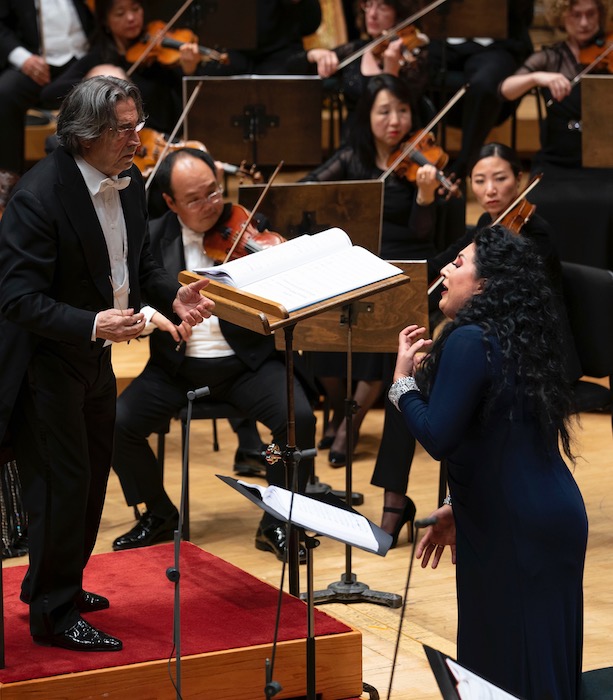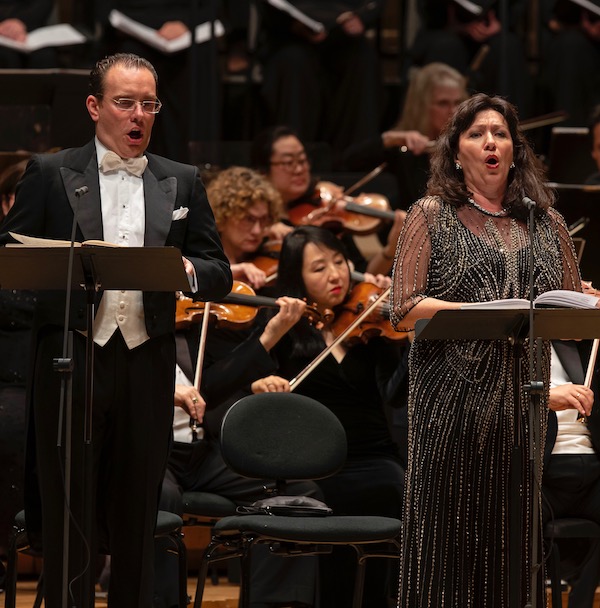“Aida” wraps an operatic CSO season with high-voltage Verdi

There was already ample operatic drama in abundance this Chicago Symphony Orchestra season, as a contentious musicians’ strike shut down Symphony Center for seven weeks in March and April.
On Friday night we got the real thing, with Riccardo Muti leading the orchestra, CSO Chorus and a starry lineup of international singers in a concert performance of Verdi’s Aida. There are two more performances through Tuesday to close the orchestra’s 128th season.
With its exotic setting and melodramatic tale of the tragic love affair between the Egyptian general Radames and the captured title Ethiopian princess, Aida remains the grandest of grand operas with rousing choruses, rich orchestration and an unceasing torrent of celebrated arias and vocal and dramatic opportunities for all four principals.
For mavens, a concert performance of Aida offers a kind of operatic power washing: clearing away the stage pageantry, lavish sets, costumes, and visual spectacle allows one to zero in on the singing and Verdi’s remarkable score. With Riccardo Muti—the greatest Verdi conductor of our day—on the podium, who needs elephants?
Anytime Muti conducts a Verdi opera, it’s an event, and the previous CSO concert performances of Otello, Macbeth and Falstaff, all remain high watermarks in his Chicago tenure.
This fourth concert in Muti’s Verdi series was largely on the same level, with high-voltage orchestral playing and a consistently strong cast with moments of truly memorable singing.
Yet Friday night’s Aida also felt like a work in progress at times—unusual for the extended rehearsal period Muti demands and gets for these events. Marking by the cast was said to be extensive throughout rehearsals, and there were moments—especially the Aida-Amneris scene in Act II— that were oddly lacking in dramatic tension. Muti’s occasional tendency to micromanage singers also made for a flat and fussy final duet (“O terra, addio”) when the doomed lovers’ ethereal farewell to life should soar.
But mostly, this was a rousing, vocally distinguished and often thrilling Aida, well timed to close a troubled and uneven CSO season on a successful note.
Adding some extramusical drama, the projected English surtitles were turned off after Act I— eliciting a few scattered boos—because, an announcement informed the audience, of “malfunctioning” and “noise.” Strange, because the titles appeared to be working perfectly and no sound was audible from the lower balcony, but apparently there was enough sonic distress to prove distracting to the maestro. Happily, the CSO is providing full librettos with English translation to audience members, so everyone could still follow the action.

The bespectacled Francesco Meli could pass for a professorial science instructor at the Politecnico di Milano. But the Italian tenor immediately showed his vocal bona fides, leading off the three-hour-and-twenty-minute performance with a heroic “Celeste Aida,” a slight break between registers and crooned top note apart. Past that tortuous aria’s challenge, the Genoa native was outstanding, showing both strength and elegance, Meli’s lyric instrument possessing reserves of power for the massed ensembles. He brought impassioned intensity to his confrontation with the spurned Amneris and gently wistful regret to the final scene, as Ramses and Aida are entombed forever.
The wild card in this Aida, surprisingly, turned out to be Krassimira Stoyanova in the title role. A memorable Desdemona in Muti’s 2011 CSO Otello, she has sung the role of Aida to acclaim at the Met and elsewhere.
Yet the Bulgarian soprano seemed less at ease Friday night. Her voice sounded rather slender for the role, wanting in fullness and body. If “Ritorna vincitor” sounded wispy at times, Stoyanova brought characteristic dramatic depth and emotional commitment. Her “O patria mia,” was gorgeous, rendered with silvery tone and glowing pianissimos. The singer was dabbing her nose and at one point appeared to retrieve and swallow what looked like throat lozenges, so perhaps she was suffering from a slight cold. (Stoyanova will return to sing the title role in Verdi’s Luisa Miller at Lyric Opera this fall.)
The evening was stolen lock, stock and barrel by Anita Rachvelishvili who delivered a rock-star performance as the villainous Amneris. Standing imperiously, with her dark mascara and long black tresses, the tall Georgian mezzo-soprano looked like she meant business before she sang a note.
A couple high notes were shaky early on, but Rachvelishvili ratcheted up her performance and portrayal with each succeeding act, while staying in scary character throughout, even during entrances and exits. It’s a rare Aida where the opening scene of Act IV is the dramatic high point of the night but such was the case on Friday. The mezzo brought rich sable tone and almost unhinged intensity to Amneris’s climactic scene, with the agitated princess caught between her unrequited love for Radames, her angry jealousy at Aida and thirst for revenge on both. The degree of emotional desperation in Rachvelishvili’s singing was nearly clinical and wholly riveting–the kind of head back, old-fashioned, no-holds barred singing one rarely encounters in the opera house today. Wow.
As Aida’s father Amonasro, Kiril Manolov’s malign, hefty baritone suited the vengeful King of Ethiopia who convinces his daughter to betray her lover.
It was luxury casting indeed to have two singers who usually star at major houses in smaller roles. Ildar Abdrazakov brought his dark, commanding bass to the high priest Ramfis, with imposing stentorian denunciations of Radames as a traitor. Eric Owens provided regal tone and ballast as the King of Egypt.
Tasha Koontz’s solos as the High Priestess were polished but loud and plain-spun, lacking in otherworldly mystery. Issachah Savage was a serviceable Messenger.
Under the direction of Duain Wolfe, the singers of the Chicago Symphony Chorus were at their considerable finest, delivering sumptuous impact to the ensemble scenes and shaded vocalism to the subtler moments, as with the men’s hushed prayers of the temple priests.
The orchestra, of course, produced the requisite sonic spectacle. (Micah Wilkinson, principal trumpet of the Pittsburgh Symphony was in the first chair Friday night.) Bolstered by on-stage banda with extra brass arrayed on either side, the Triumphal March swaggered as one would expect under Muti’s direction, with the massive climax to Act 2 likely setting off car alarms in the Grant Park South garage.
Viscerally thrilling as the big set pieces were, Verdi’s nuanced moments proved just as striking under Muti’s exacting direction, as with the tender delicacy of the strings at the opening of Act III and in the opera’s final moments. William Welter’s wonderfully evocative obbligato in “O patria mia” and solos elsewhere were a consistent pleasure. What a fine way for this gifted musician to close his first season as principal oboe.
Aida will be repeated 3 p.m. Sunday and 7:30 p.m. Tuesday. cso.org; 312-294-3000.
Posted in Performances





Posted Jun 22, 2019 at 4:47 pm by Paul C
The CSO has never sounded better than in Act II. Much is made of the cost of these productions. As a long-time subscriber, I would pay more for these special events . . .if paying higher ticket prices alone is the answer.
Posted Jun 22, 2019 at 8:20 pm by Peter DG
From my seat, main floor second row center, the extraneous sound was quite loud. The stage crew was working on the supertitles device minutes before the performance was to start. They finally got the “silence cell phones” message to display and hoisted the device.
When Muti got the hall to go quiet before his downbeat I heard a noise that to me sounded like a bad ventilation motor. It was very noticeable whenever the music got real quiet. Normally Orchestra Hall has absolutely no ambient sound–a real gem venue for delicate music. In contrast, the Lyric Opera House has so much mechanical noise that you’d never even notice this level of sound. During Act II the offending sound was gone. And from where I was sitting the titles were way too high to read comfortably.
As to the music, it was the most spectacular I ever heard at Orchestra Hall. The ensemble singing from 5 or 6 of the world’s best voices just 20 feet away was spine tingling. To my ear the strongest voice was Meli’s. It was piercing. Rachvelishvili’s voice was not quite that forceful but it had a more pleasing mellow tone.
The orchestra is the other star in this show. I’ll be back there Tuesday up front in the balcony for that experience.
Posted Jun 22, 2019 at 9:08 pm by John
I have to differ to some degree with this assessment. Most importantly, Francesco Meli had significant limitations. He had only two volume levels that prevented the nuance so necessary for Radames. Eric Owens was surprisingly underweight, raising even greater concern about next year’s Ring.
Most significantly,Stoyanova was defiantly artistic as Aida. Yes, more heft would have been welcome but her artistry and stunning vocal control went far beyond the inevitably disappointing Aidas I’ve heard over the years.
Posted Jun 23, 2019 at 9:29 am by William Tedford
Great Review of an amazing performance!
Posted Jun 26, 2019 at 9:40 pm by Steve
Somewhat disappointed with this Aida, especially considering the high-caliber performances of Otello, Macbeth, and Falstaff that Chicago audiences have been so luckily treated to in recent years. There were glaring mistakes by the cast. As I followed carefully along with the libretto, I noticed that some of the singers either didn’t sing certain lines (e.g. “Salvator della patria” was completely omitted) or said completely wrong words. There were even mistakes by the trumpeters during the ‘famous’ Triumphal March!
Was this a simple case of nervousness or, rather, a lack of serious preparation (which should not be the case considering Muti’s reputation for extremely meticulous rehearsals)? Muti’s Verdi usually takes the cake, but this performance left much to be desired…